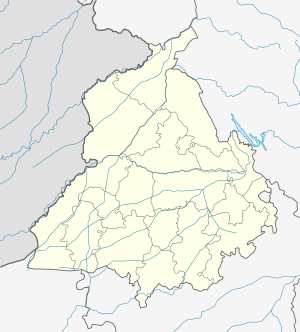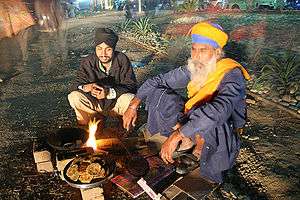Fatehgarh Sahib
| Fatehgarh Sahib ਫ਼ਤਿਹਗੜ੍ਹ ਸਾਹਿਬ | |
|---|---|
| city | |
|
Fatehgarh Sahib Gurdwara, Punjab | |
 Fatehgarh Sahib  Fatehgarh Sahib Location in Punjab, India | |
| Coordinates: 30°38′50″N 76°23′35″E / 30.64722°N 76.39306°ECoordinates: 30°38′50″N 76°23′35″E / 30.64722°N 76.39306°E | |
| Country |
|
| State | Punjab |
| District | Fatehgarh Sahib |
| Elevation | 246 m (807 ft) |
| Population | |
| • Total | 50,788 |
| Languages | |
| • Official | Punjabi |
| Time zone | IST (UTC+5:30) |
| PIN | 140406,140407 |
| Telephone code | +91-1763 |
| Vehicle registration | PB23 |
| Website |
www |
Fatehgarh Sahib is a city and the headquarters of Fatehgarh Sahib district, one of the twenty districts in the north west Indian state of Punjab.
History
The city is an historically important settlement north of the city of Patiala and is of special significance to followers of the Sikh faith. The Gurdwara Fatehgarh Sahib, 5 km (3.1 mi) north of Sirhind, marks the burial site of the two younger sons of the tenth Guru of the Sikhs, Sri Guru Gobind Singh. Here, Sahibzada Fateh Singh and Sahibzada Zorawar Singh were entombed while still alive on 26 December 1704 on the orders of the Governor of Sirhind, Wazir Khan.[1][2]
The word "Fatehgarh", means "Town of Victory", and is so called because in 1710, Sikhs under the leadership of Banda Bahadur overran the area and razed the fort built during Balban's rule to the ground.

Gurdwara Jyoti Sarup lies about 1 kilometre (0.62 mi) from Fatehgarh Sahib on the Sirhind-Chandigarh road. At this place, the mortal remains of Mata Gujri, the mother of Guru Gobind Singh and his two younger sons, Sahibzada Fateh Singh and Sahibzada Zorawar Singh were cremated. Wazir Khan, the then Faujdar or Governor of Sirhind, refused to allow the cremation of the bodies unless the land for the cremation was purchased by laying gold coins on it. Todar Mal, who was an ardent devotee of Guru Gobind Singh, purchased this piece of land by offering the gold coins as demanded and thereby etched his name in the annals of Sikh history and earned the title "Dewan".
The town is surrounded by four memorial gates, each in memory of four important figures from Sikh history associated with Sirhind. These are: Diwan Todar Mal, Nawab Sher Muhammed Khan from Malerkotla, Baba Banda Singh Bahadur and Baba Moti Ram Mehra. Each of these individuals belonged to a different caste or religion, showing the harmony and brotherhood among people of those times.
_at_Fatehgarh_Sahib_Gurdwara%2C_Punjab%2C_India.jpg)
Sirhind is noted as the burial site of the renowned Mujaddad Alif Saani - Sheikh Ahmad Farooqi Sirhindi (Rh), a great Sufi saint and founder and repairer of the Naqshbandi-Majaddaddi school of Sufiism and graceism. His mausoleum along with that of his sons the Hz. Masoom Sahib's along with several others are located 200 metres (660 ft) from Gurdwara Fateh Garh.
See also
References
- ↑ Sirhind Tourist Circuits & Cities of Punjab at punjabgovt.nic.in.
- ↑ http://www.whereincity.com/photo-gallery/gurudwaras/fatehgarh-sahib-205.htm
